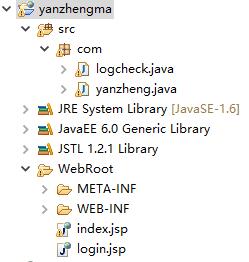java web 实现验证码
`验证码的作用:通常的登录或者注册系统时,都会要求用户输入验证码,以此区别用户行为和计算机程序行为,目的是有人防止恶意注册、暴力破解密码等。
实现验证码的思路:用 server 实现随机生成数字和字母组成图片的功能,用 jsp 页面实现显示验证码和用户输入验证码的功能,再用 server 类分别获取图片和用户输入的数据,判断两个数据是否一致。
代码块
1.编写数字、英文随机生成的 server 类,源码:
package com;
import java.awt.Color;
import java.awt.Font;
import java.awt.Graphics;
import java.awt.image.BufferedImage;
import java.io.ByteArrayOutputStream;
import java.io.IOException;
import java.io.PrintWriter;
import javax.imageio.ImageIO;
import javax.servlet.ServletException;
import javax.servlet.ServletOutputStream;
import javax.servlet.http.HttpServlet;
import javax.servlet.http.HttpServletRequest;
import javax.servlet.http.HttpServletResponse;
import javax.servlet.http.HttpSession;
public class logcheck extends HttpServlet {
public logcheck() {
super();
}
public void destroy() {
super.destroy();
}
public void doGet(HttpServletRequest request, HttpServletResponse response)
throws ServletException, IOException {
doPost(request, response);
}
/*实现的核心代码*/
public void doPost(HttpServletRequest request, HttpServletResponse response)
throws ServletException, IOException {
response.setContentType("image/jpeg");
HttpSession session=request.getSession();
int width=60;
int height=20;
//设置浏览器不要缓存此图片
response.setHeader("Pragma", "No-cache");
response.setHeader("Cache-Control", "no-cache");
response.setDateHeader("Expires", 0);
//创建内存图像并获得图形上下文
BufferedImage image=new BufferedImage(width, height,BufferedImage.TYPE_INT_RGB);
Graphics g=image.getGraphics();
/* * 产生随机验证码 * 定义验证码的字符表 */
String chars="0123456789ABCDEFGHIJKLMNOPQRSTUVWXYZ";
char[] rands=new char[4];
for(int i=0;i<4;i++){
int rand=(int) (Math.random() *36);
rands[i]=chars.charAt(rand);
}
/* * 产生图像 * 画背景 */
g.setColor(new Color(0xDCDCDC));
g.fillRect(0, 0, width, height);
/* * 随机产生120个干扰点 */
for(int i=0;i<120;i++){
int x=(int)(Math.random()*width);
int y=(int)(Math.random()*height);
int red=(int)(Math.random()*255);
int green=(int)(Math.random()*255);
int blue=(int)(Math.random()*255);
g.setColor(new Color(red,green,blue));
g.drawOval(x, y, 1, 0);
}
g.setColor(Color.BLACK);
g.setFont(new Font(null, Font.ITALIC|Font.BOLD,18));
//在不同高度输出验证码的不同字符
g.drawString(""+rands[0], 1, 17);
g.drawString(""+rands[1], 16, 15);
g.drawString(""+rands[2], 31, 18);
g.drawString(""+rands[3], 46, 16);
g.dispose();
//将图像传到客户端
ServletOutputStream sos=response.getOutputStream();
ByteArrayOutputStream baos=new ByteArrayOutputStream();
ImageIO.write(image, "JPEG", baos);
byte[] buffer=baos.toByteArray();
response.setContentLength(buffer.length);
sos.write(buffer);
baos.close();
sos.close();
session.setAttribute("checkcode", new String(rands));
}
public void init() throws ServletException {
// Put your code here
}
}2.用于显示验证码的页面:
<%@ page language="java" import="java.util.*" pageEncoding="UTF-8"%>
<% String path = request.getContextPath(); String basePath = request.getScheme()+"://"+request.getServerName()+":"+request.getServerPort()+path+"/"; %>
<html>
<head>
<base href="<%=basePath%>">
<title>indextitle>
<meta http-equiv="pragma" content="no-cache">
<meta http-equiv="cache-control" content="no-cache">
<meta http-equiv="expires" content="0">
<meta http-equiv="keywords" content="keyword1,keyword2,keyword3">
<meta http-equiv="description" content="This is my page">
head>
<body>
<form action="yanzheng" method="post">
<input type="text" name="name" size="5" maxlength="4">
<a href="index.jsp"><img border="0" src="logcheck">a><br><br>
<input type="submit" value="提交">
form>
body>
html>
3.用于检查输入的验证码是否正确:
package com;
import java.io.IOException;
import java.io.PrintWriter;
import javax.jms.Session;
import javax.servlet.ServletException;
import javax.servlet.http.HttpServlet;
import javax.servlet.http.HttpServletRequest;
import javax.servlet.http.HttpServletResponse;
import javax.servlet.http.HttpSession;
public class yanzheng extends HttpServlet {
public yanzheng() {
super();
}
public void destroy() {
super.destroy();
}
public void doGet(HttpServletRequest request, HttpServletResponse response)
throws ServletException, IOException {
doPost(request, response);
}
/*核心代码*/
public void doPost(HttpServletRequest request, HttpServletResponse response)
throws ServletException, IOException {
String info=null;
/*获取输入的值*/
String value1=request.getParameter("name");
/*获取图片的值*/
HttpSession session=request.getSession();
String value2=(String)session.getAttribute("checkcode");
/*对比两个值(字母不区分大小写)*/
if(value2.equalsIgnoreCase(value1)){
info="验证码输入正确";
}else{
info="验证码输入错误";
}
System.out.println(info);
request.setAttribute("info", info);
request.getRequestDispatcher("/login.jsp").forward(request, response);
}
public void init() throws ServletException {
// Put your code here
}
}4.显示输入结构界面(输入验证码是否正确):
<%@ page language="java" import="java.util.*" pageEncoding="UTF-8"%>
<% String path = request.getContextPath(); String basePath = request.getScheme()+"://"+request.getServerName()+":"+request.getServerPort()+path+"/"; %>
<html>
<head>
<base href="<%=basePath%>">
<title>My JSP 'login.jsp' starting pagetitle>
<meta http-equiv="pragma" content="no-cache">
<meta http-equiv="cache-control" content="no-cache">
<meta http-equiv="expires" content="0">
<meta http-equiv="keywords" content="keyword1,keyword2,keyword3">
<meta http-equiv="description" content="This is my page">
head>
<body>
<%=request.getAttribute("info") %>
body>
html>
